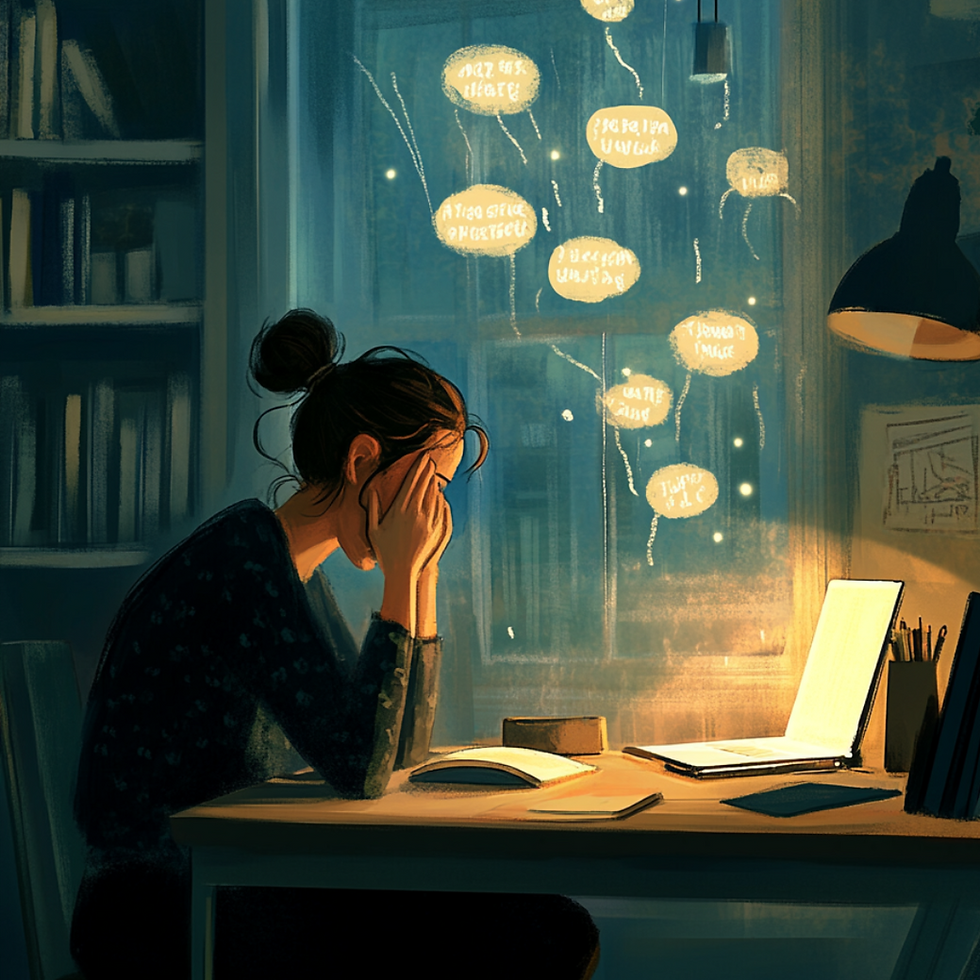The Silent Epidemic: What Teen Depression Really Looks Like in High-Performers
- Briggett Harris
- May 25
- 3 min read

By Briggett Harris, LMHC
When Success Hides the Struggle
They’re the teens who always show up.The ones who get straight A’s, captain the team, lead the club.They seem focused, driven, and capable.
But behind the polished resumes and packed calendars, something else is happening:They’re exhausted. Emotionally flat. Constantly overwhelmed.And most people don’t realize these teens are quietly battling depression.
Welcome to the silent epidemic of high-functioning teen depression—a crisis often overlooked because it doesn’t look the way we expect.
The Rise of Depression in High-Achieving Teens
According to 2023 CDC data, over 40% of U.S. high school students report persistent sadness or hopelessness, with Florida teens showing nearly identical rates. Among those diagnosed with depression, many are still showing up to class, turning in homework, and achieving top academic performance.
That’s what makes it so dangerous.
High-achieving teens often go undiagnosed because their depression doesn’t lead to skipped assignments or failing grades. Instead, it hides behind perfectionism, overachievement, and a deep fear of letting anyone down.
What High-Functioning Teen Depression Really Looks Like
You won’t always see tears, isolation, or obvious withdrawal. In high performers, depression often shows up as:
Overcompensation: Working harder to avoid feeling inadequate
Perfectionism: Setting unrealistically high standards and beating themselves up for small mistakes
Emotional numbness: Feeling “empty” or like they’re just going through the motions
Irritability or hypersensitivity: Small setbacks trigger intense frustration or self-criticism
Overthinking and rumination: Obsessing over schoolwork, social dynamics, or their own perceived flaws
Burnout: Constant fatigue, lack of motivation, and sleep disturbances despite maintaining output
These students may not say, “I’m depressed,” but they might say:
“I just feel off lately.”“I don’t feel excited about anything anymore.”“If I don’t do well, I’ll fall apart.”“I feel tired all the time, no matter how much I sleep.”
Common Myths About High-Performing Teens and Depression
Myth 1: If they’re still doing well in school, they’re fine.
Truth: Depression doesn’t always affect grades, especially when fear of failure is a core driver.
Myth 2: They’re just stressed—they’ll bounce back.
Truth: Chronic stress can evolve into depression, especially when students never get a break from pressure.
Myth 3: They have everything going for them—what do they have to be depressed about? Truth: Depression isn’t about circumstances. It’s about internal experience, and high performers often feel deeply isolated, unseen, and ashamed of their emotional pain.
Why Traditional Advice Falls Flat
When teens open up about feeling overwhelmed, they’re often met with advice like:
“You just need to take a break.”
“You’re doing great—don’t be so hard on yourself.”
“Just get some rest and push through.”
While well-meaning, this advice usually misses the mark because it doesn’t address the deeper issue:
These teens don’t just need rest. They need emotional relief.
They’re not just tired. They’re dysregulated, emotionally depleted, and stuck in a cycle of over-functioning to outrun their pain.
Emotional Regulation: The Key to Healing Under the Surface
Unlike basic coping skills, emotional regulation helps students understand, process, and manage their internal world. It builds resilience and teaches them how to respond to emotional distress without avoidance or collapse.
By learning emotional regulation, teens begin to:
Name and validate their feelings without shame
Quiet the inner critic that fuels perfectionism
Build tools to soothe themselves during academic or social stress
Recover faster from setbacks and burnout
Shift from surviving to truly living
Evidence-Based Strategies to Help High-Performing Teens With Depression
These therapeutic tools—rooted in CBT, DBT, ACT, and Narrative Therapy—are powerful ways to support emotional regulation and recovery:
Cognitive Reframing (CBT): Help students challenge thoughts like “I’m a failure” or “I have to be perfect.”
Behavioral Activation: Encourage small, manageable actions tied to enjoyment, not achievement.
Emotional Labeling (EFT): Teach the difference between “sad” and “disconnected,” “ashamed,” or “overwhelmed.”
Values Clarification (ACT): Help teens explore who they want to be beyond grades or titles.
Self-Compassion Practices: Rewire the inner voice that says “You’re not good enough” into one that says “You’re doing your best.”
Narrative Rebuilding: Support teens in telling a new story—one that includes struggle and strength.
Final Thoughts: Let’s Stop Missing the Signs
Depression doesn’t always look like failure.Sometimes, it looks like straight A’s.Sometimes, it looks like a perfect Instagram feed.Sometimes, it looks like your kid is pushing through—until they can’t anymore.
If you’re a parent, teacher, or counselor supporting a high-achieving student, don’t wait for the crisis. Look for the quiet signs. Ask deeper questions. Offer real tools.
And if you're a student who feels like you're falling apart behind the scenes, you’re not alone, and you don’t have to keep pretending.
👉 Download our free 50 Practical Strategies for Emotional Regulation
👉 Book a consultation to explore personalized therapy support for high-functioning depression




Comments